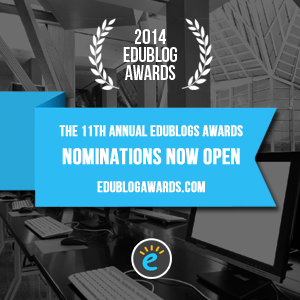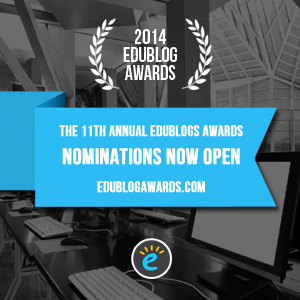Category: Blogging
End of Year Tips: Update Your Online Presence
 This week, I’m providing tips for end-of-year technology maintenance. These are activities that could (or should) be done once a month if you’re active on your computer, but AT LEAST do them yearly.
This week, I’m providing tips for end-of-year technology maintenance. These are activities that could (or should) be done once a month if you’re active on your computer, but AT LEAST do them yearly.
Like today.
For most teachers I know, life zooms by, filled with lesson planning, meetings, classes, collaborations with their grade-level team, parent meetings, and thinking. There are few breaks to update/fix/maintain the tech tools that allow us to pursue our trade.
But, that must happen or they deteriorate and no longer accomplish what we need them to do. Cussing them out does no good. Buying new systems takes a long time and doesn’t fix the problem that the old one wasn’t kept up. If they aren’t taken care of, we are left wondering why our teacher blog or website isn’t accomplishing what it does for everyone else, why our social media Tweeple don’t generate activity, and why our TPT materials languish. There’s a short list of upkeep items that won’t take long to accomplish. The end of the calendar year is a good time to do these:
Share this:
- Click to share on Facebook (Opens in new window) Facebook
- Click to share on X (Opens in new window) X
- Click to share on LinkedIn (Opens in new window) LinkedIn
- Click to share on Pinterest (Opens in new window) Pinterest
- Click to share on Telegram (Opens in new window) Telegram
- Click to email a link to a friend (Opens in new window) Email
- More
Tech Tip #113: Back up Your Blog!
As a working technology teacher, I get hundreds of questions from parents about their home computers, how to do stuff, how to solve problems. Each Tuesday, I’ll share one of those with you. They’re always brief and always focused. Enjoy!
Q: I’m paranoid of losing my documents so I back them up to an external drive, a flash drive, and in the cloud. My blog, though–It’s become an important cog in my teacher PLN. If it blew up, I’d be lost. What do I do about backing it up?
A: If you use Wordpress, it’s easy, they provide a native tool for that. Here’s what you do:
- Go to Tools>Export
- Select the bubble for ‘all’
- It’ll back it up as an XML file (you don’t have to understand what that is. Just know it’s the file that will save you if Wordpress crashes)
- Save that backup file somewhere safe in case you need it. Preferably where your Cloud automatic back-up will grab it (assuming you have one of those. If you use Carbonite, you do)
- Do this once a month–or a week if you’re active
This will back up your posts, pages, comments, categories, and tags. For the entirety of the blog–similar to a time machine, where you can restore the entire website–you’ll need an external service. My Wordpress.org blog is hosted by WPEngine. Part of that service is a back-up of the blog. It’s worth it to me to pay a bit extra for that function.
That’s it. Now you’re safe.
Share this:
- Click to share on Facebook (Opens in new window) Facebook
- Click to share on X (Opens in new window) X
- Click to share on LinkedIn (Opens in new window) LinkedIn
- Click to share on Pinterest (Opens in new window) Pinterest
- Click to share on Telegram (Opens in new window) Telegram
- Click to email a link to a friend (Opens in new window) Email
- More
6 Tips I Wish I’d Known When I Started Blogging
 I’ve been blogging for about six years, some professionally (for my tech ed career) and others on topics of interest to me (writing, USNA, that sort). That first post–putting myself on the line, ignoring that I had no hits, wanting to approve comments from spammers because that would look like someone loved me–I thought that was the hard part. The second post was easier and so it went.
I’ve been blogging for about six years, some professionally (for my tech ed career) and others on topics of interest to me (writing, USNA, that sort). That first post–putting myself on the line, ignoring that I had no hits, wanting to approve comments from spammers because that would look like someone loved me–I thought that was the hard part. The second post was easier and so it went.
But somewhere around the twentieth post, I figured out I had to do blogging right. I couldn’t simply show up, spout off and slink away. There was a lot more to ‘blogging’. I could have quit–it was getting to be a lot like work–but I enjoyed the camaraderie with like-minded souls. I learned a lot about writing by doing it and could transfer those lessons to my students. So I honed my skill.
Now, years later, there are a few items I wished I’d known early rather than late. Let me share them with you so you don’t have the hard lessons I did:
- only reblog 10% of someone else’s post. If you’re on WordPress and push the ‘reblog’ button, they take care of it for you. But if you copy someone’s post and give them attribution, you blew it. You have to get permission if you are reposting more than 10% of someone’s work. Where was I supposed to learn that?
Share this:
- Click to share on Facebook (Opens in new window) Facebook
- Click to share on X (Opens in new window) X
- Click to share on LinkedIn (Opens in new window) LinkedIn
- Click to share on Pinterest (Opens in new window) Pinterest
- Click to share on Telegram (Opens in new window) Telegram
- Click to email a link to a friend (Opens in new window) Email
- More
End of Year Tips: Is Your Online Presence Up to Date?
 This week, I’m providing tips for end-of-year technology maintenance. These are activities that could (or should) be done once a month if you’re active on your computer, but AT LEAST do them yearly.
This week, I’m providing tips for end-of-year technology maintenance. These are activities that could (or should) be done once a month if you’re active on your computer, but AT LEAST do them yearly.
Like today.
For most teachers I know, life zooms by, filled with lesson planning, meetings, classes, collaborations with their grade-level team, parent meetings, and thinking. There are few breaks to update/fix/maintain the tech tools that allow us to pursue our trade.
But, that must happen or they deteriorate and no longer accomplish what we need them to do. Cussing them out does no good. Buying new systems takes a long time and doesn’t fix the problem that the old one wasn’t kept up. If they aren’t taken care of, we are left wondering why our teacher blog or website isn’t accomplishing what it does for everyone else, why our social media Tweeple don’t generate activity, and why our TPT materials languish. There’s a short list of upkeep items that won’t take long to accomplish. The end of the calendar year is a good time to do these:
Share this:
- Click to share on Facebook (Opens in new window) Facebook
- Click to share on X (Opens in new window) X
- Click to share on LinkedIn (Opens in new window) LinkedIn
- Click to share on Pinterest (Opens in new window) Pinterest
- Click to share on Telegram (Opens in new window) Telegram
- Click to email a link to a friend (Opens in new window) Email
- More
Edublog Nominee
 The 2014 Edublog Awards is a community based initiative started in 2004 in response to concerns relating to how schools, districts and educational institutions were blocking access to educational blog sites. The purpose of the Edublog awards is promote and demonstrate the educational values of these. Once a year, about this time of year, we bloggers get ten days to nominate our favorites in categories that include:
The 2014 Edublog Awards is a community based initiative started in 2004 in response to concerns relating to how schools, districts and educational institutions were blocking access to educational blog sites. The purpose of the Edublog awards is promote and demonstrate the educational values of these. Once a year, about this time of year, we bloggers get ten days to nominate our favorites in categories that include:
- Individual Blog
- Group Blog
- New Blog
- Class Blog
- Student Blog
- EdTech Blog
- Teacher Blog
- Library/Librarian Blog
- Administrator Blog
- Influential Post
- Individual Tweeter
- Twitter Hashtag
- Free Web Tool
- Video/Podcasts
- Educational Wiki
- Best Open PD
- Social Network
- Mobile App
- Lifetime Achievement
Share this:
- Click to share on Facebook (Opens in new window) Facebook
- Click to share on X (Opens in new window) X
- Click to share on LinkedIn (Opens in new window) LinkedIn
- Click to share on Pinterest (Opens in new window) Pinterest
- Click to share on Telegram (Opens in new window) Telegram
- Click to email a link to a friend (Opens in new window) Email
- More
5 Top Ways to Integrate Technology into the New School Year
I was reading an article–Five Real Reasons Why Teachers Don’t Use Technology More–from eSchool News listing the reasons why teachers don’t use technology. Included were some that probably resonate with educators at your school–
- it keeps changing so how do you decide what to choose
- too much to do, too little time
- teachers are pulled in too many directions
- unreliable technology
- no respect for the teacher’s voice in this tech ed process
I was nodding, thinking of people the reasons fit perfectly–and then I noticed: The article was written in
1999!
That’s right–fifteen years ago and nothing’s changed.
Have you been giving the same reasons for fifteen years too, hoping the tech demons will just go away and leave you to teach in peace? Every June, do you say, I got through another year without this or that tech tool–and everything went well.
Share this:
- Click to share on Facebook (Opens in new window) Facebook
- Click to share on X (Opens in new window) X
- Click to share on LinkedIn (Opens in new window) LinkedIn
- Click to share on Pinterest (Opens in new window) Pinterest
- Click to share on Telegram (Opens in new window) Telegram
- Click to email a link to a friend (Opens in new window) Email
- More
3 Problems to Address Before Blogging at Your School
 Dear Otto is an occasional column where I answer questions I get from readers about teaching tech. For your privacy, I use only first names.
Dear Otto is an occasional column where I answer questions I get from readers about teaching tech. For your privacy, I use only first names.
Here’s a great question I got from Molly:
I really enjoyed your article on students blogging. It seems like a great way to get them writing willingly since they love to be online. I was wondering, what are some of the problems you have run into and how did you solve them? What pitfalls can teachers watch out for long-term?
Three big–not necessarily ‘problems’ as much as issues to address:
Digital rights and responsibilities
You don’t want to roll out blogging in your classroom without a sturdy program educating students on digital citizenship–privacy, profiles, footprints, safety, fair use/copyrights. I have lots of information on those topics on my blog. Another good resource is Common Sense Media.
Share this:
- Click to share on Facebook (Opens in new window) Facebook
- Click to share on X (Opens in new window) X
- Click to share on LinkedIn (Opens in new window) LinkedIn
- Click to share on Pinterest (Opens in new window) Pinterest
- Click to share on Telegram (Opens in new window) Telegram
- Click to email a link to a friend (Opens in new window) Email
- More
13 Ways Blogs Teach Common Core
 If you aren’t blogging with your students, you’re missing one of the most effective tools available for improving student literacy and math. Blogs are easy to use, fun for students, encourage creativity and problem-solving, allow for reflection and feedback, enable publishing and sharing of work, and fulfill many of the Common Core Standards you might be struggling to complete. Aside from math and literacy, Common Core wants students to become accomplished in a variety on intangible skills that promote learning and college and career readiness. Look at these 13 benefits of blogging and how they align with Common Core:
If you aren’t blogging with your students, you’re missing one of the most effective tools available for improving student literacy and math. Blogs are easy to use, fun for students, encourage creativity and problem-solving, allow for reflection and feedback, enable publishing and sharing of work, and fulfill many of the Common Core Standards you might be struggling to complete. Aside from math and literacy, Common Core wants students to become accomplished in a variety on intangible skills that promote learning and college and career readiness. Look at these 13 benefits of blogging and how they align with Common Core:
- provide and get feedback–building a community via comments is an integral part of blogging. If you didn’t want feedback, you’d publish a white paper or submit work the old fashioned hard copy way. When students publish their ideas in blogs, other students, teachers, parents can provide feedback, join the conversation, and learn from the student.
- write-edit-review-rewrite–teachers don’t expect students to get it right the first time. Part of the writing process is revising, editing, rewriting. This is easy with blogs. Students publish a topic, collect comments, incorporate these ideas into their own thinking, then edit their post.
- publish–the idea that student work is created for a grade then stuffed away in a corner of their closet is disappearing. Current educators want students to publish their work in a way that allows everyone to benefit from the student’s knowledge and work. There are many ways to do that–blogs are one of the easiest.
- share–just like publishing, students no longer create for a grade; they share with others. Blogs allow for sharing of not only writing, but artwork, photography, music, multimedia projects, pretty much anything the student can create.
- collaborate–blogs can easily be collaborative. Student groups can publish articles, comment on others, edit and rewrite. They can work together on one blog to cover a wider variety of topics and/or make its design attractive, appealing and enticing to readers.
- keyboarding–blogs are small doses of typing–300-500 words, a few dozen for comments. This is an authentic opportunity to practice the keyboarding skills students will need for Common Core Standards in 4th grade and up.
- demonstrate independence–blogs are about creativity. No two are alike. They offer lots of options for design and formatting so students can tweak it to their preference. Because they are open 24/7, students can do blog work when it suits them, not in the confines of a 50-minute class.
- build strong content knowledge–blog posts can be drafted as the student collects information, posted when the student is ready. Links can be included to provide evidence of student statements, as well as linkbacks for reference and deeper reading for interested students.
- respond to the varying demands of audience, task, purpose, and discipline–Students can create their work in whatever digital tool fits the audience, task, purpose they are focused on, then embed it into their blog post. This is possible even in a simplified blogging platform like KidBlog. Most online tools (Voki, Wordle, Tagxedo) provide the html codes that can be easily placed in the blog post. Then, the student at their option can focus on presenting their ideas as music, art, photos, text, an infographic, a word cloud–whatever works for their purposes.
- comprehend as well as critique–student bloggers are expected to critique the posts of others by thoroughly reading the post and commenting based on evidence. If the reader doesn’t understand, they ask questions in the comments. This insures that when they evaluate the post, they have all the information required to reach a conclusion.
- value evidence–blogs make it easy to provide all the necessary evidence to support a point of view. Students can link back to sources to provide credit and link to experts to provide credibility for statements. In fact, in the blogosphere, good bloggers are expected to do this as a means of building credibility for opinions they write
- use technology and digital media strategically and capably--certainly blogs are great for writing, but they’re also excellent as digital portfolios to display student work developed in a variety of places. Students pick the technology that fits what they’re expected to accomplish in a class, then publish it to the blog. Have you seen the movies students put together on a topic? Some are amazing.
- understand other perspectives and cultures–blogs are published to the internet. Even private blogs are accessed by many more people than possible with a hand-written paper. Students write knowing that people of all cultures and perspectives will read their material, knowing they can add comments that share their beliefs. This encourages students to develop the habit of thinking about perspective as they write.
Share this:
- Click to share on Facebook (Opens in new window) Facebook
- Click to share on X (Opens in new window) X
- Click to share on LinkedIn (Opens in new window) LinkedIn
- Click to share on Pinterest (Opens in new window) Pinterest
- Click to share on Telegram (Opens in new window) Telegram
- Click to email a link to a friend (Opens in new window) Email
- More
7–no 10, wait 12–OK, 13 Skills I Teach With Blogging
 Blogging has become de rigeur in the Grade 3-8 classroom. It is flexible, scalable, and encourages diversity in both learning and teaching. Handled right, blogs can be used for pretty much any need that arises in the classroom. It has the added benefit of being an activity that students want to do. They like that it’s online, with lots of multimedia options, and a focus not on writing but communication.
Blogging has become de rigeur in the Grade 3-8 classroom. It is flexible, scalable, and encourages diversity in both learning and teaching. Handled right, blogs can be used for pretty much any need that arises in the classroom. It has the added benefit of being an activity that students want to do. They like that it’s online, with lots of multimedia options, and a focus not on writing but communication.
I decided to track the skills I teach through blogging. When I started, I had seven, but as I continued, it exploded to this long list that I’m adding to even as I write this post. Read through these, tell me other ways you use it in your class:
Collaboration
Students collaborate on blogs when they comment on the ideas of others. They can also take it a step further by collaborating on the blog itself. Be co-owners of the blog, themed to a particular topic, and work together to fulfill goals.
Developing a profile
Blog profiles must be pithy, concise, and clear. What a great way for students to think through what makes them who they are and share it in as few words as possible. I am constantly reworking my own as I figure out a better way to communicate the gist of who I am.
Differentiation
Share this:
- Click to share on Facebook (Opens in new window) Facebook
- Click to share on X (Opens in new window) X
- Click to share on LinkedIn (Opens in new window) LinkedIn
- Click to share on Pinterest (Opens in new window) Pinterest
- Click to share on Telegram (Opens in new window) Telegram
- Click to email a link to a friend (Opens in new window) Email
- More
1.69 Million Hits–Wow
 I have to pause a moment to thank all of you for that amazing number. Who would have thought three-and-a-half years ago when I started Ask a Tech Teacher, I’d reach 1,000,000 hits. Now I’m over 1.6. Wow.
I have to pause a moment to thank all of you for that amazing number. Who would have thought three-and-a-half years ago when I started Ask a Tech Teacher, I’d reach 1,000,000 hits. Now I’m over 1.6. Wow.
Jacqui Murray has been teaching K-18 technology for 30 years. She is the editor/author of over a hundred tech ed resources including a K-12 technology curriculum, K-8 keyboard curriculum, K-8 Digital Citizenship curriculum. She is an adjunct professor in tech ed, Master Teacher, webmaster for four blogs, an Amazon Vine Voice, CSTA presentation reviewer, freelance journalist on tech ed topics, contributor to NEA Today, and author of the tech thrillers, To Hunt a Sub and Twenty-four Days. You can find her resources at Structured Learning.
Share this:
- Click to share on Facebook (Opens in new window) Facebook
- Click to share on X (Opens in new window) X
- Click to share on LinkedIn (Opens in new window) LinkedIn
- Click to share on Pinterest (Opens in new window) Pinterest
- Click to share on Telegram (Opens in new window) Telegram
- Click to email a link to a friend (Opens in new window) Email
- More









































